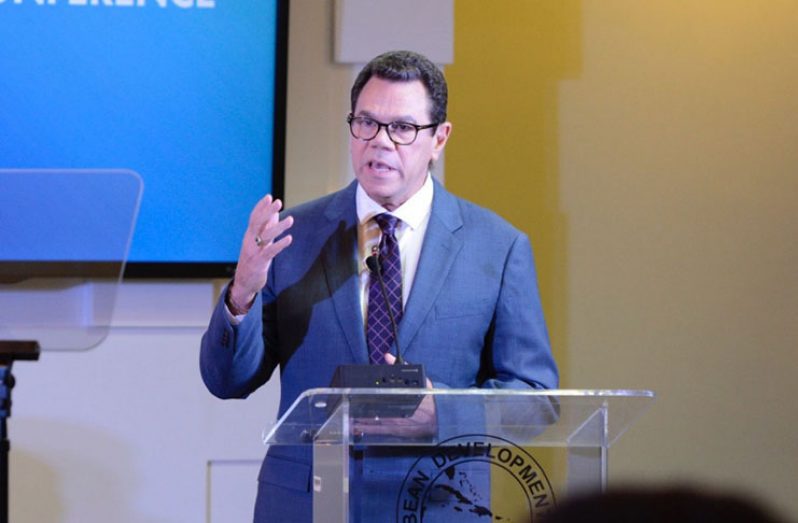…says burden rests on backs of four countries
THE Caribbean Development Bank (CBD) is pushing for the widening of shareholding in LIAT as CDB President Dr. William Warren Smith noted that the burden of the airline’s regional aviation sits on the backs of four countries.
Smith, on the sideline of the bank’s 2019 Annual News Conference in Barbados on Thursday, highlighted these countries as Barbados, St. Vincent and the Grenadines,, Dominica and Antigua and Barbuda. His call coincides with the recommendations of a recent study financed by the CDB which is now before shareholders of the airline.
Speaking of the four aforementioned countries, he said: “When new money has to be injected into the airline, those are the ones who do it…that is not right. There are some countries in this Region that get a tremendous amount of LIAT flights and traffic and they are not paying their fair share, so that has to be addressed.”
LIAT is majority-owned by 11 Caribbean governments which, apart from the four, include Grenada, Guyana, Jamaica, St. Kitts and Nevis, Montserrat, St. Lucia and Trinidad and Tobago.
Other shareholders include various banks, unions, associations and corporations. This need for restructuring of the regional airline is further underscored with a number of other challenges the study identified regarding passenger traffic and the travel route of the airline.
Smith said that one of the most startling findings of the study is that at some point in time, LIAT was able to transport some 1.2 million passengers per year, but now transports a little over 700,000 passengers.
“That’s a massive drop,” the CDB President said. “I don’t think we need to be airline people to appreciate the impact that has on revenues.”
One aspect believed to be affecting the rate of traffic is the high cost of travelling with the airline, which Smith said is made up of almost 50 per cent taxes. One of the study’s recommendations was for a dramatic reduction in the level of taxation.
“I must confess that I am disappointed that those recommendations have not been taken on board in the way in which we had anticipated they would have. One could argue that it is taking place in the context of a number of our countries facing financial difficulties and therefore they had to put their fiscal situation first. But, I think sometimes we’re not sufficiently farsighted in the way in which we approach these reforms and we don’t recognise that many of our countries benefit quite a bit from aviation,” he said.
Two of the countries Smith listed as the biggest beneficiaries from aviation in the Region are Barbados and Antigua.
“It is for them, in collaboration with the management of LIAT, to make the appropriate changes that would put the airline on a different footing,” Smith said.
Meanwhile, there are other concerns regarding LIAT and the way passengers transit from one aircraft to another within the Caribbean island chain. “At the present time there is a significant amount of stopping and starting of the island chain and one of the recommendations was that LIAT should look now towards moving a hub-and-spoke type of arrangement. What this hub-and-spoke arrangement does is it would facilitate the travel. Business people, for example, would be able to move from Trinidad and Tobago in the morning and get to St. Maarten in the afternoon, or even in the morning also, so that they can do business there and come back home in the same day,” Smith explained, adding: “That would be a major change.”
Should these inefficiencies be corrected, the CDB President said that it would lead to improvements in the overall performance of the airline and positively impact its financial performance. However, should they be ignored, they will stymie the potential growth of the Organisation of Eastern Caribbean States (OECS) and others dependent on the airline in the Region. In July, 2018, LIAT had introduced daily, low-fare flights between Guyana and Trinidad and Antigua to encourage further travel between the two islands and Guyana.




.jpg)










